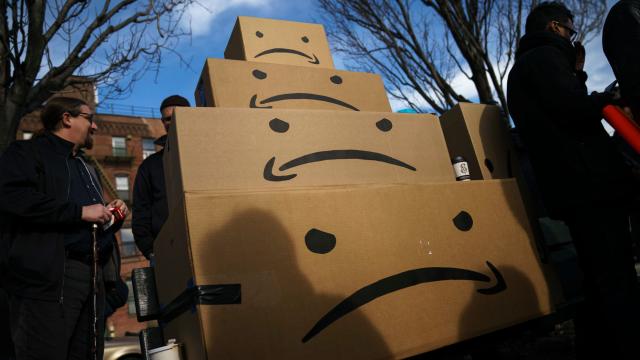Amazon is currently experimenting with a pilot program that turns warehouse jobs into a sort of video game, a system the company claims is meant to break up the monotony of the day-to-day tasks required of its workers but has, conveniently, led to competition among employees to outperform their colleagues, according to reports.
The Washington Post reported on the games in detail on Tuesday, writing that Amazon has implemented these quasi-video games at five of its warehouses after the program first launched at a single facility in 2017.
In short, these games work by rewarding employees for the speed with which they’re able to complete their actual job tasks.
Names of these games include MissionRacer, PicksInSpace, CastleCrafter, and Dragon Duel, according to the Post. A photo of the dragon game was shared on Tuesday by Fast Company, which reported that Amazon workers can opt to play either by themselves or compete against other workers. An Amazon spokesperson told Gizmodo by phone that employees at warehouses with the pilot program can choose whether or not to opt-in.
The Post reported that these games—played on screens at the work stations to which Amazon’s warehouse robots deliver items to be sorted—reward workers “with points, virtual badges, and other goodies throughout a shift.” In at least one warehouse, rewards also include an internal currency called Swag Bucks, which can be exchanged for Amazon-branded gear, according to the Post.
If you’re curious, Fast Company has an actual screenshot of one of the Amazon warehouse games I reported on today @washingtonposthttps://t.co/hB4huzD0hNhttps://t.co/Yht1ERtXjA pic.twitter.com/LWO2zaiorx
— Greg Bensinger (@GregBensinger) May 21, 2019
Fast Company reported that in the dragon game, which it witnessed first hand, employees playing the game “are rewarded 16 points for each product they pick,” and players can see how they rank among others playing the game, though the company told Gizmodo the leaderboard displays players anonymously.
“‘Gamification’ is a big focus for us in making jobs more interesting,” Dave Clark, Amazon’s SVP of Worldwide Operations, tweeted Tuesday. “We have a variety of games single and multi player. The objective is simple – take something that can be pretty boring and make it more interesting and hopefully fun.”
The company strongly disputed the characterisation of the games as intended to boost productivity or pit workers against one another—even if by design and through incentives like prizes and points that is quite literally what the pilot program does—insisting instead that they were created to make its increasingly tedious warehouse environments more “fun,” engaging, and collaborative.
Whether the company chooses to regard this Black Mirror-like operation as one that boosts its bottom line, it certainly doesn’t seem to be hurting it.
One employee who spoke to the Post on the condition of anonymity claimed that she had picked nearly 500 items off Amazon’s robot shelves in an hour, whereas the standard at some fulfilment centres is already 400 at the speed of one item every 7 seconds.
This person also told the Post that the game had created a competitive environment among workers at her facility, though the employees who the paper spoke with did seem to find the game broke up some of the monotony of their work.
Despite the fact that the pilot program has reportedly been around for some time, reports on its use in Amazon’s facilities also come as the company shifts from a two-day to closely monitors.
A spokesperson did say in a statement, however, that Amazon has “performance expectations for every Amazon associate and we measure actual performance against those expectations.”
“Associate performance is measured and evaluated over a long period of time as we know that a variety of things could impact the ability to meet expectations in any given day or hour,” the spokesperson said. “We support people who are not performing to the levels expected with dedicated coaching to help them improve.”
Listen, if a company wants to wring its employees of all the labour it can possibly squeeze out of them for the same measly pay, turning its workplace into a giant video game sure appears to be one creative if not ethically questionable way to do it.
Meanwhile, the company’s CEO, Jeff Bezos, fresh off an expensive-as-hell divorce, remains the richest man in the world.
